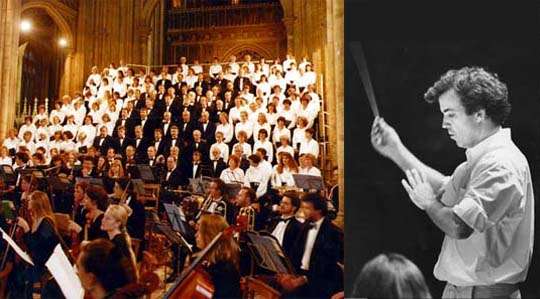|
LA GLOIRE

RODERIC DUNNETT writes about Berlioz' Grande Messe des Morts
The l999 Canterbury Festival draws to a rousing
close this weekend with two performances of Berlioz's massive Grande
Messe des Morts (Requiem, l837), given by the Canterbury Choral
Society, together with the Royal Choral Society and the Royal Philharmonic
Orchestra, under the baton of Richard Cooke.The performances are on Saturday
30th October at 7.30 in Canterbury Cathedral (a sell-out), and on Sunday
31st at 7.30 in the Royal Albert Hall (for which some tickets are still
available : +44 (0)171-589-8212).

The Canterbury Choral Society and Richard Cooke.
Recent Canterbury Choral Society concerts have
included widely praised performances of Dvorak's Stabat Mater, Beethoven's
Missa Solemnis and Britten's Spring Symphony, in addition
to another Berlioz marathon, his La Damnation de Faust, with Brian
Bannatyne-Scott (currently Longborough Festival Opera's resident Wotan in
Wagner's Rheingold and Walküre) in superb form as Mephistophélés.
Brahms's Requiem (lst April) and Mozart's C minor mass (24 June)
follow in the new year (+44 (0)1227-455600).
But this weekend's two events will involve some
of the largest forces amassed in recent years.
Berlioz (l803-69) composed his Grande Messe des Morts in his mid-thirties,
with the success of the Symphonie Fantastique already behind him
and Benvenuto Cellini (l838) and Romeo and Juliet (1839) on
the way. He once declared that if all but one of his works were to perish,
he would be content for his reputation to rest on the Requiem alone.
Behind it is the idea of 'la Gloire' : the Requiem was a State
commission, originally proposed to honour the dead of the l830 insurrection,
although in fact composed in the mid-l830s and first heard later that decade
at an elaborate ceremony staged in the chapel of Les Invalides to commemorate
a Napoleonic commander who perished in the recent Algerian campaign.
Berlioz recalls in his memoirs the jealousies, intrigues, arguments and
resignations that surrounded its first performance - not least the fact
that he was forced to bow to tradition and allow M.Habeneck, who held the
ancient office of 'premier violon de la musique du roy', and was a man with
whom the 34 year old composer had been known to cross swords before - to
conduct. Berlioz himself was let loose on one rehearsal.
Continue >>
Copyright © Roderic Dunnett, October
28th 1999
 << Music &
Vision homepage Wexford
Festival Opera >>
<< Music &
Vision homepage Wexford
Festival Opera >>
|